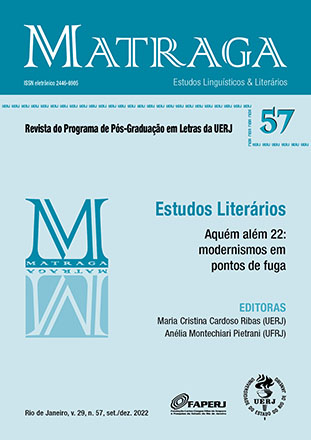The Language of Brazilian Modernism: a comparative perspective
DOI:
https://doi.org/10.12957/matraga.2022.67141Palavras-chave:
Brazilian Modernism, Language, Comparative perspective.Resumo
The Brazilian Modernists did not constitute a unified movement at the beginning of the 20th century, nor did they have a consolidated agenda of themes to be dealt with or widely shared techniques to deal with them or even a unified vision about language. Throughout the first decades of that century, the Modernists formed different groups (some of which defined themselves through manifestos) and sought, in different ways, to contrast what they were doing with what previous literary generations had done, sometimes rejecting and at other times acknowledging their relationship with the previous literary tradition. As far as the issue of language is concerned, it is not usual to bring a comparatist dimension to discussions of language in Brazilian Modernism, maybe because we should always bear in mind that looking comparatively at literary periods brings with it a series of problems. But our goal here is exactly to discuss the language of Brazilian Modernism in a comparative perspective.
----------------------------------------------------------------------------------------------------------------
A LÍNGUA DO MODERNISMO BRASILEIRO: UMA PERSPECTIVA COMPARADA
O Modernismo brasileiro não constituiu um movimento unificado no início do século XX, nem teve uma agen- da consolidada de temas tratados ou técnicas amplamente compartilhadas, nem mesmo uma visão unifica- da sobre língua. Ao longo da primeira década daquele século, os modernistas formaram grupos diferentes (alguns dos quais se definiram através de manifestos) e procuraram, de maneiras diversas, contrastar o que faziam com o que gerações prévias tinham feito, algumas vezes rejeitando, outras admitindo sua relação com a tradição literária anterior. No que diz respeito à língua, não é comum trazer uma dimensão comparatista a discussões de língua no Modernismo brasileiro, talvez porque deveríamos sempre considerar que lançar um olhar comparativo sobre períodos literários implica uma série de problemas. No entanto, nosso objetivo aqui é exatamente discutir a língua do Modernismo brasileiro em perspectiva comparada.
---
Original em inglês.
Downloads
Downloads
Publicado
Como Citar
Edição
Seção
Licença
AUTORIZAÇÃO
A Matraga – Revista do Programa de Pós-Graduação em Letras da UERJ está autorizada a publicar o artigo ora submetido, caso seja aceito para publicação online. Fica atestado que a contribuição é original, que não está sendo submetida a outro editor para publicação, e que a presente declaração é a expressão da verdade.
Os trabalhos publicados no espaço virtual da Matraga – Revista do Programa de Pós-Graduação em Letras da UERJ serão automaticamente cedidos, ficando os seus direitos autorais reservados à Matraga. Sua reprodução, total ou parcial, é condicionada à citação dos autores e dos dados da publicação.

A Matraga utiliza uma Licença Creative Commons - Atribuição-NãoComercial 4.0 Internacional.





